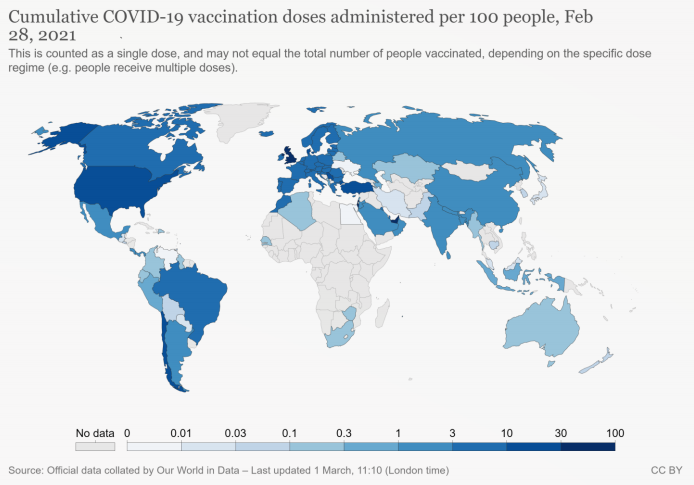Key Takeaways
Optimism around Covid-19 vaccine development is giving way to logistical challenges in actioning complex immunisation programmes. Facing delays and the risk of resurgent case rates on the back of new variants, governments will continue to implement restrictions to mitigate transmission of SARSCoV-2, the virus that causes the disease, Covid-19.
The strength of economic recovery will vary across countries, depending on access to medical interventions and responsible allocation of policy support. The economic aftershock will hit lower- and middle-income countries (LMICs) hardest, and there is heightened risk that prolonged economic
disruption will drive unrest in countries with low social capital.
We expect a K-shaped recovery through 2021 favouring large capacity firms while small and mediumsized enterprises (SMEs), and the service sector, face prolonged disruptions. The continued deployment of Covid-related restrictions as a pre-vaccine stop gap will widen this recovery gap,
forcing high closure rates among SMEs.
Without effective integration of vaccine support mechanisms such as mass testing, organisations must brace for heightened operational risk through 2021. As vaccination campaigns progress, a multitooled approach utilising testing and protection equipment improves risk management capabilities,
building accountability within and across relevant organisations.
Questions Over Vaccine Efficacy
SARS-CoV-2 remains an omnipresent threat to societies as governments continue undertaking unprecedented political actions, with travel and economic activity heavily restricted. Many organisations across all sectors of the global economy expect economic activity to resume in some
form as governments continue distributing vaccines.
While a promising range of vaccines do offer people immunity and protection from virus-related illness, they are not a panacea to solving the Covid-19 pandemic. It is far from certain if vaccines will eradicate Covid-19, a milestone reached only once before with smallpox.
Positive data on the effectiveness of vaccines in distribution has emerged in recent weeks, but questions hang over the length of immunity offered, how long they may reduce transmission for, or whether they can prevent transmission of SARS-CoV-2 – the higher immunological bar.
The emergence of new variants of SARS-CoV-2 amplifies these questions. The South African government is offering to swap or sell its consignment of AstraZeneca's vaccine, after trial data indicated a drop in the vaccine's effectiveness against the South African variant of SARS-CoV-2. Japanese and American authorities have also detected new strains of SARS-CoV-2 with similar mutations to the South African variant.
Complicating this picture are warnings from health experts and NGOs that the inequitable distribution of vaccines heightens the risk of uncontrolled spread of SARS-CoV-2, which would drive the emergence of more virulent strains of the virus.
Overall, questions over vaccine effectiveness and the risk of new variants paint an uncertain picture. As a result, most societies will continue living with some form of restrictions through 2021.

Constraints to Equitable Distribution
The pervasive impact of Covid-19 is driving unprecedented demand for vaccines that exceeds manufacturing capacity, limiting government endeavours to vaccinate their populations. Many countries, particularly lower- and middle-income countries (LMICs), are unlikely to receive enough vaccine to cover their populations until 2023 or 2024.
While pharmaceutical companies are scaling up manufacturing capacity through 2021, most of these companies need to consider outsourcing production to fulfil global demand. Some pharmaceuticals'
have outsourced capacity already, but intellectual property (IP) rights on Covid related vaccines and technology stand to frustrate further efforts.
Human rights organisations warn that IP rights could reinforce monopolies and price out LMICs, which would hinder equitable distribution. Notably, the United States (US), United Kingdom (UK) and European Union (EU), among others, blocked a proposal submitted by South Africa and India to waive provisions of the Trade Related Aspects of the Intellectual Property Rights (TRIPS) that would facilitate technology transfers on Covid-19 vaccines and treatments.
However, even if governments and the pharmaceutical sector addressed manufacturing constraints, some Covid-19 vaccines demand onerous logistical requirements, which frustrate distribution across countries with weak public health infrastructure....
